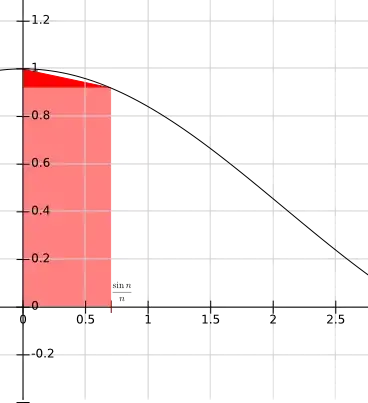$\frac{\sin x}{x}$ is a continuous function, thus
$$\lim_{a\rightarrow 0}\int_0^a \frac{\sin x}{x}\,dx\ \ \ \mbox{ is always equal to } 0.$$
But that is not enough.
$\frac{\sin x}{x}$ is also positive in a neighborhood of 0, thus all the integrals for $n$ greater than some fixed $N$ are positive. It doesn't depend on the sign of $\frac{\sin n}{n}$, since the integrated function is even. But the fact $\frac{\sin n}{n}$ is not necessarily positive forbids you to write
$$\int_0^{\frac{\sin n}{n}} \frac{\sin x}{x}\,dx \le \frac{\sin n}{n}
$$
like Norbert has done. Correct estimate looks like
$$\int_0^{\frac{\sin n}{n}} \frac{\sin x}{x}\,dx \le \frac{|\sin n|}{n}.$$
So the solution is not that simple.
$\frac{\sin x}{x}$ is decreasing and convex on $[0, 1]$:

So we can estimate the integral from below as the square of highlighted region:
$$
\int_0^{\frac{\sin n}{n}} \frac{\sin x}{x}\,dx \ge \left.\frac{\sin x}{x}\right|_{x=\frac{|\sin n|}{n}}\cdot\frac{|\sin n|}{n} + \frac{1}{2}\cdot\frac{|\sin n|}{n}\cdot\left(1 - \left.\frac{\sin x}{x}\right|_{x = \frac{\sin n}{n}}\right) =
$$
$$
= \frac{1}{2}\sin\left(\frac{|\sin n|}{n}\right) + \frac{1}{2}\frac{|\sin n|}{n}.
$$
Thus, including my remark on Norbert's answer, your series converges if and only if $$\sum_{n=1}^{\infty}\frac{|\sin n|}{n}$$ converges.
